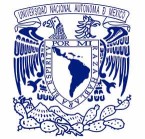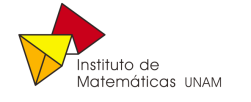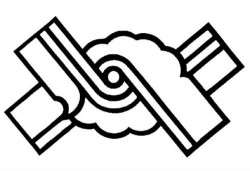International Association for Computing and Philosophy – Annual Meeting
June 5-7, 2019, Mexico City, Mexico




Conference Program (Revised 6/1)
A revised draft of the program is now available as a pdf. Apart from a few small additions, the revised program includes titles and abstracts for the Distributed Computing and Epistemic Logic tracks, as well as links and address information for the reception Wednesday evening and the banquet Thursday evening. Please note that printed copies of the program will not be provided at the conference.
Conference Registration and Banquet Fee
Please note that we are waiving conference registration fees for undergraduate and masters-level students. The nominal student fee only applies to PhD students. Note also that all registration fees include a year membership to IACAP and conference attendees will be provided certificates of attendance. We are honored by our local organizations for their generous support in helping to keep registration fees historically low.
| Registration Type (via PayPal, below) | Early | After June 1st |
| IACAP Members | $90.00 USD | $120.00 USD |
| Non-members | $100.00 USD | $130.00 USD |
| PhD Students | $25.00 USD | $30.00 USD |
Plan to enjoy the local cuisine at a Thursday evening banquet: $50.00 USD, via PayPal, below.
Logistics*
1) Venue
This year, IACAP’s annual meeting will have two venues located in the main campus of UNAM: 1.1 Instituto de Matemáticas and 1.2 Instituto de Investigaciones Filosóficas.
1.1 How to reach the Instituto de Matemáticas:
https://www.matem.unam.mx/acerca-de/location-1
1.2 How to reach the Instituto de Investigaciones Filosóficas:
http://www.filosoficas.unam.mx/sitio/ubicacion
2) Transportation
2.1 How to get from Mexico City’s Airport to your hotel or the venue:
Basically, you have 4 options: taxicab, Uber, metro and Metrobus. If you opt for a taxicab, take an authorized taxicab. Do not take any other taxicabs, just use the authorized ones. You can find information about Airport authorized taxicabs in this link:
https://www.aicm.com.mx/en/passengers/transportation/taxis
Uber is a smartphone application (Android and iOS) which works with credit/debit card.
If you are planning to use the metro or Metrobus, read 2.2 or 2.3 respectively.
2.2 Metro
The Metro of Mexico City is the best way to move around the city. Each ticket costs 5 MXN, no matter where you want to go. There are no ticket machines and you should pay with cash. To reach the main campus of UNAM you should go to “Universidad” (line 3):
https://www.metro.cdmx.gob.mx/la-red/mapa-de-la-red
2.3 Metrobus
Another good and cheap option to move around the city. You need to buy a card (you can buy it in almost every station). To reach the Philosophy Institute, get down at Centro Cultural.
https://www.metrobus.cdmx.gob.mx/mapas-de-sistema/mapa-completo-del-sistema
2.4 Pumabus
This is the bus transportation system of UNAM. You don’t have to pay to use it, just ride it and enjoy:
https://www.dgsgm.unam.mx/pumabus
2.5 Taxicabs and Uber
Please use only authorized taxicabs. Now you are wondering “How am I supposed to recognize an authorized taxicab?” Well, that’s hard even for locals. So, probably it’s easier to just use Uber.
2.6 More information on transportation
In case you need to know more about this subject, go to this link:
https://en.mapamexicodf360.com.mx/
3) Local Currency
The local currency is the Mexican Peso. Please be aware that you won’t be able to use credit/debit card to pay for public transportation, taxicabs, or to make purchases in some small shops or restaurants.
https://www.aicm.com.mx/en/passengers/shopping-and-services/financial
4) Suggestions for Accommodation (in no particular order)
Holiday Inn Plaza Universidad
https://www.ihg.com/holidayinn/hotels/gb/en/mexico/mexaa/hoteldetail
City Express Patio Universidad
https://www.cityexpress.com/en/reservacion/hotel/CEPUN
Holiday Inn Mexico Coyoacan
https://www.ihg.com/holidayinn/hotels/us/en/mexico/mexci/hoteldetail
Hotel Radisson Paríso Perisur
https://www.radisson.com.mx/en/location
Hotel El Diplomático
https://www.eldiplomatico.com.mx/en/location
5) Tourism
5.1 Top-rated tourist attractions
https://www.planetware.com/tourist-attractions-/mexico-city-mex-df-mexc.htm
5.2 Bus tours around Mexico City and Teotihuacan Pyramids (1 day tour)
http://www.turibus.com.mx/index.php?s=CircuitosPrincipales
5.3 Visiting Mexico City, a short guide. (We highly recommend you to read it.)
http://rcsl.iscte.pt/rcsl_mt_2017_Mexico_VisitingMexicoCity.pdf
6) Safety
The link provided in 5.3 contains a list of emergency and embassies phone numbers. The link below has some tips and practical information.
https://www.viahero.com/travel-to-mexico/is-mexico-city-safe-2018
Special thanks to Nancy Abigail Nuñez for compiling the above information.
Awards
2019 Covey Award: Emeritus Professor John Weckert
The International Association for Computing and Philosophy’s Executive Board has selected John Weckert for the Covey Award recognizing senior scholars with a substantial record of innovative research in the field of computing and philosophy broadly conceived.
Immediately prior to his retirement in 2013 John was Director of Centre for Applied Philosophy and Public Ethics (CAPPE) and before that was a Professorial Fellow at CAPPE at Charles Sturt University as well as Professor of Computer Ethics. He was the founding editor-in-chief of the Springer journal NanoEthics: Ethics for Technologies that Converge at the Nanoscale. He has been a visiting professor and/or research fellow at various universities including Dartmouth College, the Norwegian University of Science and Technology (NTNU), Linköping University, Sweden and the University of Santo Tomas, the Philippines. His publications and research interests are primarily in the ethics of information technology and new technologies more generally.
John’s broad and deep influence on the ethics of information technology is as widely-known as it is respected by the very community of scholars his research helped establish. What is less well-known, perhaps, is the significant impact John has had fostering by both example and personal influence the careers of many scholars who have continued following the fruitful paths of research his work brought to light. We are delighted that John will give the Covey Keynote Address at IACAP 2019 Mexico City (UNAM). Please join us there to congratulate John on this well-deserved award.
2019 Simon Award: Dr. Juan M. Durán
The International Association for Computing and Philosophy’s executive board has selected Dr. Juan M. Durán for the 2019 Herbert A. Simon Award for Outstanding Research in Computing and Philosophy, which specifically recognizes scholars at an early stage of their academic career whose research is likely to reshape debates at the nexus of Computing and Philosophy.
Juan M. Durán studied computer science and philosophy in Argentina and finished his Ph.D. in 2013 at the Simulation Technology Excellence Cluster and the Department of Philosophy of the University of Stuttgart on the explanatory power of computer simulations. He has addressed the philosophical problems of computer simulations from different perspectives, most prominently the philosophy of science (e.g., explanation, representation, modeling, experimentation), epistemology (e.g., computational reliabilism, validation), value and ethics (code of conducts, ethics of visualization), and library studies (e.g., Dark Data, Scientific Data Officer). In 2018, he published a book with Springer entitled: Computer Simulations in Science and Engineering – Concepts – Practices – Perspectives.
The Executive Board views Juan M. Durán’s selection as seamlessly continuing a tradition of awarding the best of early career scholars, highlighting their important scholarship for the broader interdisciplinary community. We applaud Juan particularly for his emphasis on the epistemic and moral normative dimensions of computational methods in the sciences, representing transformational scholarship in the philosophy of science. Juan will give the Simon Keynote Address at IACAP 2019 Mexico City (UNAM); please join us in congratulating Juan on the Simon Award.
Special Extended CFA: IACAP 2019 Distributed Computing and Epistemic Logic Track (Now Closed)
The International Association for Computing and Philosophy (IACAP) announces that submissions are now being accepted for the IACAP 2019: Distributed Computing and Epistemic Logic Track, June 5, to be held at and sponsored by the Institute of Mathematics, Universidad Nacional Autónoma de México (UNAM). This special track is being organized by,
Alexandru Baltag: ILLC Amsterdam, The Netherlands
(http://www.illc.uva.nl/People/show_person.php?Person_id=Baltag+A.B.)
Sergio Rajsbaum: Institute of Mathematics, UNAM.
(https://www.matem.unam.mx/~rajsbaum/)
This year the IACAP Annual Meeting will include a special, one-day track on research related to computing and epistemic logic, with special interest in concurrency; computing systems where multiple sequential computers or microprocessors interact. Knowledge-theoretic tools have been applied to theoretical and practical problems in distributed and multi-agent system, both to design solutions and to prove impossibility results. They and have turned out to have interesting connections with topology. From the computability perspective, fault-tolerant distributed systems are of a very different nature than Turing machines. We are looking to have interesting discussions, presentations, and foster further collaborations on these topics. The track will include introductory talks to the exciting new interconnections between computing, logic and philosophy. We invite submissions of extended abstracts for this track.
Important Dates:
Paper Presentations (Extended Abstracts):
Submission: March 24, 2019
Notification of Acceptance: May 4, 2019
Confirmed participants:
Alexandru Baltag, ILLC Amsterdam, The Netherlands
Armando Castañeda, Instituto de Matematicas, UNAM, Mexico
David Fernández-Duque, Universiteit Gent, Belgium
Sergio Rajsbaum, Instituto de Matemáticas, UNAM, Mexico
Aldo Iván Ramírez-Abarca, Utrecht University, The Netherlands
Sonja Smets, ILLC Amsterdam, The Netherlands
Ana Lucia Vargas-Sandoval, ILLC Amsterdam, The Netherlands
Fernando Velázquez-Quesada, Amsterdam University, The Netherlands
Paper submissions should be provided at:
https://easychair.org/conferences/?conf=iacap2019
Submissions for paper presentation should:
- Explicitly indicate (in the title or as the first sentence of the abstract) that it is a submission for the Distributed Computing and Epistemic Logic Track;
- Be prepared for blind review;
- Provide an extended abstract of 800-1200 words; and,
- Provide a short abstract of 150-250 words suitable for inclusion in a program.
Original Call for Abstracts
The International Association for Computing and Philosophy (IACAP) is delighted to announce that submissions are now being accepted for its 2019 annual meeting, June 5-7, to be held at and sponsored by the Institutes of Mathematics and Philosophy, Universidad Nacional Autónoma de México (UNAM). The meeting is being organized by,
Sergio Rajsbaum: Institute of Mathematics, UNAM. (https://www.matem.unam.mx/~rajsbaum/)
Luis Estrada González: Institute of Philosophy, UNAM. (http://www.filosoficas.unam.mx/sitio/luis-estrada)
Nancy Abigail Nuñez Hernandez: Maimonides Centre for Advanced Studies, University of Hamburg. (https://www.maimonides-centre.uni-hamburg.de/en/research/projects/2018-2019/nunez.html)
Francisco Hernández Quiroz: Department of Mathematics, UNAM. (http://lya.fciencias.unam.mx/fhq/english.html)
The International Association for Computing and Philosophy promotes philosophical dialogue and interdisciplinary research on all aspects of the computational and informational turn. Coming to these issues from a rich variety of disciplines, IACAP’s members have a tradition of helping to shape philosophical and ethical debates about the nature, development, application, and limits of computation, information technologies, and artificial intelligence.
IACAP’s 2019 meeting will gather philosophers, mathematicians, ethicists, logicians, roboticists, computer scientists, and cognitive scientists to explore topics including,
Artificial Intelligence
Artificial Life
Automated Warfare
Cognitive Science, Computation, and Cognition
Computational Modeling in Science and Social Science
Computer-Mediated Communication
Ethical Problems and Societal Impact of Computation and Information
Ethics and Epistemology of Big Data
History of Computing and Logic
Computability and Complexity Theory
Information Culture and Society
Metaphysics and Epistemology of Computation
Philosophy of Computer Science
Philosophy of Information
Philosophy of Information Technology
Philosophy of Mind
Robotics
Virtual Reality
… and related issues
We invite submissions of extended abstracts and proposals for symposia.
Important Dates:
Paper Presentations (Extended Abstracts):
Submission: February 15, 2019
Notification of Acceptance: March 15, 2019
Symposia Proposals:
Submission: February 1, 2019
Notification of Acceptance: February 15, 2019
Paper and symposia submissions should be provided at: https://easychair.org/conferences/?conf=iacap2019
Submissions for paper presentation should:
- Be prepared for blind review;
- Provide an extended abstract of 800-1200 words; and,
- Provide a short abstract of 150-250 words suitable for inclusion in a program.
Proposals for symposia should indicate:
- The title of the proposed symposium;
- A description of the topic and of its relevance for the IACAP membership;
- A list the participants (indicating particularly those who have confirmed their participation); and,
- The number of hours required.
Program Committee:
Patrick Allo
Brian Ballsun-Stanton
Paul Bello
Don Berkich
Selmer Bringsjord
Elizabeth Buchanan
Charles Ess
Luciano Floridi
Nir Fresco
Luis Estrada González
Frances Grodzinsky
Francisco Hernández
Nancy Abigail Nuñez Hernandez
John Licato
Patrick Lin
Steve Mckinlay
Keith Miller
James H. Moor
Gualtiero Piccinini
Thomas Powers
Giuseppe Primiero
Sergio Rajsbaum
Miguel Angel Sicart
Judith Simon
Johnny Søraker
John Sullins
Mariarosaria Taddeo
Herman Tavani
Orlin Vakarelov
Shannon Vallor
Wendell Wallach
Marty Wolf